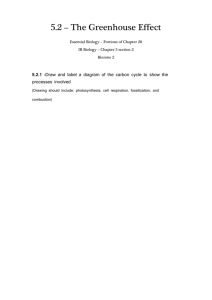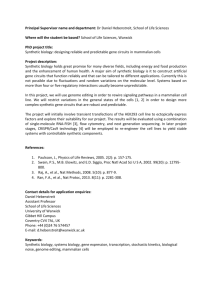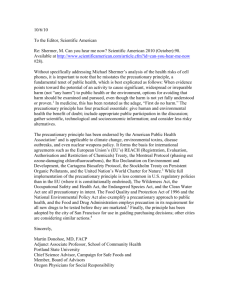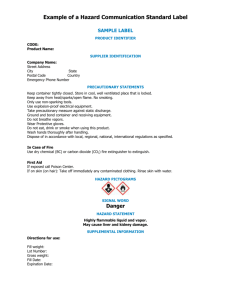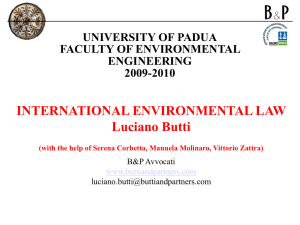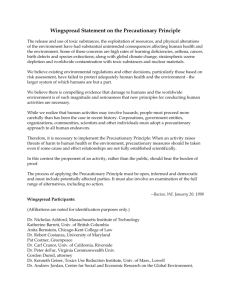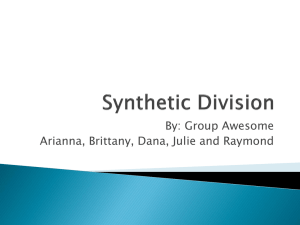Principles for the Oversight of Synthetic Biology
advertisement
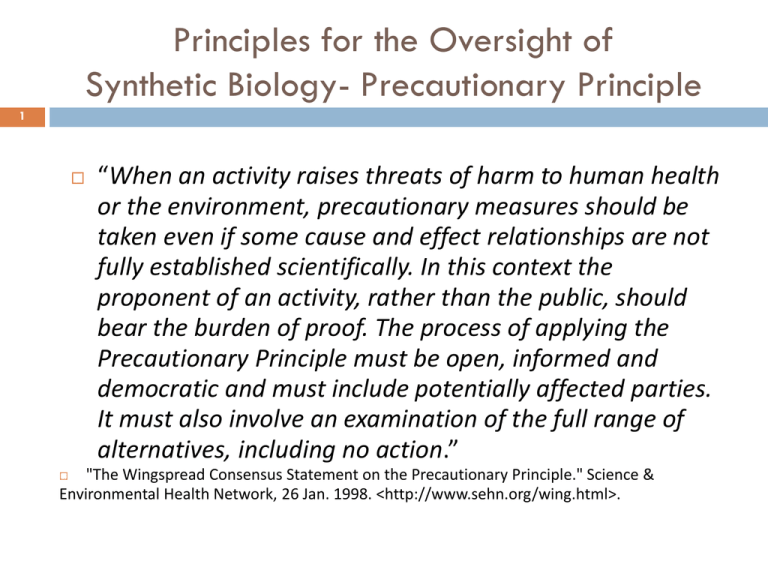
Principles for the Oversight of Synthetic Biology- Precautionary Principle 1 “When an activity raises threats of harm to human health or the environment, precautionary measures should be taken even if some cause and effect relationships are not fully established scientifically. In this context the proponent of an activity, rather than the public, should bear the burden of proof. The process of applying the Precautionary Principle must be open, informed and democratic and must include potentially affected parties. It must also involve an examination of the full range of alternatives, including no action.” "The Wingspread Consensus Statement on the Precautionary Principle." Science & Environmental Health Network, 26 Jan. 1998. <http://www.sehn.org/wing.html>. The Precautionary Principle is not new 2 Hippocrates—”First Do No Harm” CARTAGENA PROTOCOL ON BIOSAFETY CONVENTION ON CLIMATE CHANGE RIO DECLARATION ON ENVIRONMENT AND DEVELOPMENT THE LONDON CONVENTION ON THE PREVENTION OF MARINE POLLUTION BY DUMPING WASTES AND OTHER MATTER CONVENTION ON THE LAW OF THE SEA OF 10 DECEMBER 1982 (Fisheries Provisions) Precaution in US Laws 3 • • • Food and Drug Administration requires all new drugs to be tested before they are put on the market. The Food Quality and Protection Act of 1996 requires pesticides to be proven safe for children or removed. Several are being phased out. The National Environmental Policy Act is precautionary in intent: 1) It emphasizes foresight and attention to consequences by requiring an environmental impact assessment for any federally funded project, and 2) it mandates consideration of alternative plans. NEPA is one of the best national examples of precautionary action. The Wilderness Act sets aside certain areas as nonviolable. The Occupational Safety and Health Act imposes a general duty on employers to provide safe working conditions and workplaces. The Endangered Species Act sets the goal of protecting biodiversity. The Clean Water Act establishes strict goals to “restore and maintain the chemical, physical, and biological integrity of the nation's waters.” The Clean Air Act requires standards to be set to protect the most vulnerable populations. Precaution means wiser decisions 4 Precaution does not work if it is only a last resort. explore alternatives to possibly harmful actions, place the burden of proof on proponents of an activity rather than on victims or potential victims of the activity; set and work toward goals that protect health and the environment; and bring democracy and transparency to decisions affecting health and the environment. • • Synthetic Biology Needs Precaution 5 Organisms developed using synthetic biology techniques may be unpredictable Genetic engineering with synthetic biology techniques may make unintended permanent changes in genomes. The DNA/RNA of dead organisms may be acquired by bacteria. Sythetic Biology not yet predictable 6 Synthetic Biology ‘parts’ not all well characterized. Genetic circuits still unpredictable. Even work in one celled organisms very difficult as engineering becomes more complex. Unexpected responses when ‘parts’ put together. Variability is a problem, more so as organism gets more complex, or is grown in a different medium. One “typing” error kept Venter lab experiment from working initially. Why Precautionary Approach is needed for Synthetic Biology (1) 7 Synthetic Biology is many “biologies”, Drugs and human medical applications should go through FDA review Bio-fuels projects using algae, especially, need be reviewed as though they are an invasive species. Precautionary Approach for Synthetic Biology continues (2) 8 Much Synthetic Biology research is publically funded. Research on taking a precautionary approach not being funded Pre-market safety testing and review needed Monitoring and tracking technology must be part of the approval process Precautionary Approach (3) 9 Coordinated Framework for Biotechnology Developed by Reagan White House in 1984. Assumes that existing law is adequate for new biotechnologies, no additional regulations needed Does not work well for ge animals, insects, or even plants, much less synthetic biologies. Put US at odds with its trading partners. New Framework/Regulations needed for new synthetic biologies. Precautionary Approach Continues (4) 10 Licensing of synthetic biologists/ students by state or national authorities, not self monitored or university monitored. Greater oversight of pathogens being synthetically engineered, i.e. cholera, flu viruses, polio. All projects that have potential to change the genomes of animals need extra oversight. Bonding for all projects involving government loan guarantees. THANK YOU! 11 Jaydee Hanson Program Director International Center for Technology Assessment 660 Pennsylvania Avenue, SE Suite 302 Washington DC 20003 jhanson@icta.org (202) 547-9359 x24
